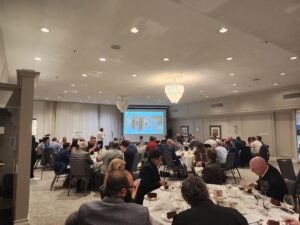
This year, like many others, was my first time attending the Low Carbon Home Builders Coalition. It was a great opportunity to network with other professionals such as Builders, Manufacturers, Contractors, City Officials, and many other industry stakeholders who share the vision of creating sustainable and affordable housing for our province. There were many great speakers at this event talking about Codes, Carbon, and the future of our housing. Furthermore, highlighting an important topic that was discussed is Combination Hybrid Heat Mechanical Systems, which is a cutting-edge, cost efficient technology that can reduce greenhouse gas emissions and energy costs. This heating and cooling strategy will keep the utility bills as low as possible for the occupants of the home and will be able to comfortably condition the home during any season of the year. In my opinion this Hybrid Heating solution is one of the key solutions to deal with carbon emissions while also maintaining affordable living. It taps into Ontario’s biggest energy source – off peak electricity surplus.
As we move towards reducing our carbon footprint it is very important that all parties involved in the building industry understand the target. Net Zero being the buzz word of today, understanding what Net Zero means and how it can be achieved is important for individuals, businesses, governments, and all parties involved. Currently, the net zero homes that we are building and labeling fall short of the targets we are trying to achieve. In that there actual performance is “not” zero. We need to continue the conversation so that the industry and innovators can support each other in their common goals.
Being a Residential HVAC Designer working with McCallum HVAC Design Inc, we consult with clients daily about making decisions regarding mechanical equipment and building envelope. The future of energy efficiency starts with the selection of insulation, the type of heat source and the control strategy.
I am hoping that being on the board of the Sustainable Housing Foundation will give me opportunities to meet new like-minded individuals, preview into what code changes are coming in the future and how I can better prepare myself and my company, McCallum HVAC with the continuously changing landscape of energy efficiency and low carbon technologies. Not only to know about the change, but also to give myself a voice in the discussion.
Michael McCallum – Newest board member
McCallum HVAC Design Inc.

LCHC September 26th 2023 in Thornhill




Recent Comments